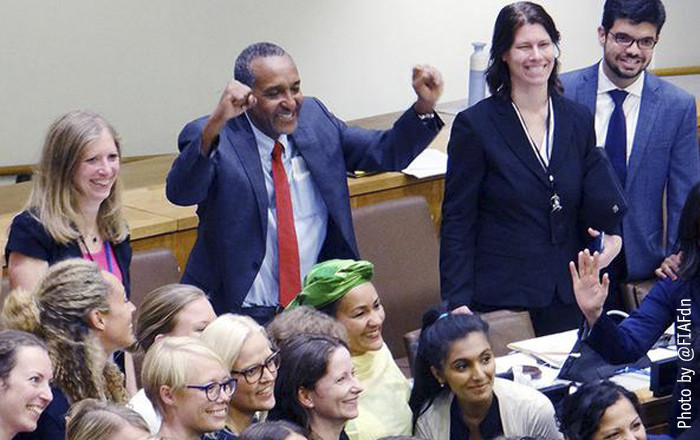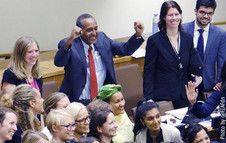
On August 3, U. N. Member States reached consensus on the Sustainable Development Goals and finalized the outcome document, “Transforming Our World: The 2030 Agenda for Sustainable Development”.
Even before the confirmation of the final 17 SDGs, the inclusive nature of the Post-2015 process itself represented a major victory for our constituency. In stark contrast to the negotiation process of the Millennium Development Goals, maintained exclusively between Member States, this time around the process was opened up to local and regional government networks and other stakeholders. The Global Taskforce of Local and Regional Governments took full advantage of this opportunity; we actively participated in the Open Working Group, campaigned with partners from the international urban community for a stand-alone Urban SDG, and co-led a consultation of local and regional governments on ‘Localizing the Post-2015 Agenda’.
‘Transforming Our World’ proves that the advocacy efforts of UCLG and the Global Taskforce at the UN were not in vain. SDG 11 to “make cities and human settlements inclusive, safe, resilient and sustainable” is, in large part, the fruit of our hard-fought campaign with the urban community. Fortunately, SDG 11 survived calls to reduce the overall number of goals, and will be the first-ever international agreement on urban-specific development. SDG 11 is the only goal with a sub-national geographical dimension, and represents the growing international acknowledgement of the transformative power of urbanization. For local governments in particular, SDG 11 represents an unprecedented opportunity to engage and mobilize mayors and city leaders behind the Post-2015 Agenda by directly addressing their daily concerns and responsibilities, from urban planning to waste management.
However, as important as SDG 11 is, all of the Post-2015 goals and targets touch on local responsibilities. Basic local services provided by local governments will be crucial to the achievement SDG 1 on ending poverty and SDG 6 on water and sanitation; local institutions will have to play our part in achieving target 5.5. on ensuring women’s full and effective participation and equal opportunities for leadership and decision-making; and targets on sustainable agriculture, production and consumption patterns, sustainable tourism that promotes local culture, and climate change mitigation and adaptation also have strong local dimensions.
The challenge going forward is to ensure that the SDGs are understood and taken on by local and regional institutions, and that they have the necessary capacities and resources to implement them effectively. Language in paragraph 45 that commits Member States to “work closely on implementation with regional and local authorities” is a positive sign that the essential role of local governments will be recognized and taken into account in the implementation of the Agenda.
 The final declaration also makes specific reference to the “upcoming United Nations Conference on Housing and Sustainable Urban Development”, thanks to a late addition to the text, proposed by Ecuador. This gives the Habitat III Conference equal status in the declaration as COP21, which is mentioned in the paragraph focused on climate change. Hopefully, this is an indication that the international community will build on the momentum of SDG 11 and give due attention to Habitat III, the first implementation conference after the Post-2015 Development Summit.
The final declaration also makes specific reference to the “upcoming United Nations Conference on Housing and Sustainable Urban Development”, thanks to a late addition to the text, proposed by Ecuador. This gives the Habitat III Conference equal status in the declaration as COP21, which is mentioned in the paragraph focused on climate change. Hopefully, this is an indication that the international community will build on the momentum of SDG 11 and give due attention to Habitat III, the first implementation conference after the Post-2015 Development Summit.
The SDGs will be adopted at the Special Summit on Sustainable Development on September 25-27, at U. N. Headquarters in New York. In the run up to the Summit, the Global Taskforce will continue to advocate for the localization of the means of implementation and of the indicators of the Post-2015 Agenda, highlighting the importance of monitoring progress at sub-national level to ensure that no-one is left behind. We will also take advantage of Urban October and World Cities Day to highlight the vital links between the SDGs and Habitat III.
Related news:
- Momentum builds behind call to give local governments a special status at Habitat III
- Noting Habitat III in the SDGs text would have "enormous meaning" for implementation
- UCLG reaction to final draft of Post-2015 Development Agenda Summit outcome document











